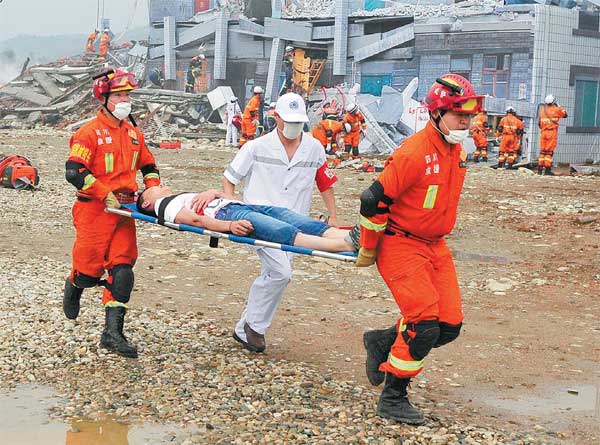
Sichuan province rehearsed dealing with disaster on Friday with a mock magnitude-8 earthquake along the Longmenshan fault zone at 1 pm.
Under the scenario of the disaster prevention and relief drill, the epicenter was in Jiezi township in Chongzhou. Dozens of people were buried in rubble, nearly 1,000 others injured. Houses were toppled, water, electricity and gas services and telecommunications crippled, in Jiezi and surrounding areas. A lake formed in Jiuling township, Jiangyou, and mudslides occurred in Qingping township, Mianzhu.
About 10 minutes after the imaginary quake took place, Liu Qibao, secretary of the Sichuan provincial committee of the Communist Party of China, convened a meeting of leading officials from the government and the armed forces, ordering police to guard major roads so rescue personnel could quickly reach the scene.
|
 Rescuers rush to save a "victim' at a disaster prevention drill in Chongzhou, Sichuan province, on Friday. The drill marks the fourth anniversary of the deadly Wenchuan earthquake that claimed more than 80,000 lives. [Photo by Wang Xiwei/for China Daily] |
Amid a deafening siren, helicopters took off from the Fenghuangshan Military Airport in Chengdu, where firefighters, soldiers, militia, medics and volunteers from various areas converged to rush to the earthquake zone.
Four helicopters soon hovered in the sky over Jiezi where roads were blocked, dropping food, medicine, drinking water, clothes, radios and flashlights. Emergency communication maintenance personnel were also parachuted into the town, where they used a satellite phone to report the situation in the epicenter.
Approaching Jiezi, soldiers on assault boats heard cries for help. Nine locals were drowning in the Weijiang River.
To prevent propellers from hurting them and the boat’s bow washing them away, soldiers threw life-buoys to them and pulled them to the boat.
After transferring people from low areas near the earthquake lake in Jiuling township, rescue personnel from the Sichuan provincial department of water resources and the armed forces used explosives to loosen the rocks and mud forming the lake so that workers with excavators could remove them to divert water to a designated course.
“With more and more rocks and mud removed, floods discharged rapidly and the danger of the earthquake lake was eliminated,” announced Ren Jianmin, deputy mayor of Mianyang, which has Jiangyou under its administration.
The quake triggered mudslides in Yongjia Valley in Qingping township, Mianzhu, where soil was loosened following the Wenchuan earthquake in May 2008.
Fortunately, there were no casualties thanks to the timely warning.
After excessive rain before the earthquake, officials in the township knew that landslides were possible. They used sirens, radio and hand-held microphones to persuade villagers near the mock disaster site to be evacuated.
To ensure that nobody was left behind, village officials visited one house after another, beating gongs and calling to residents to leave.
No one in the valley was hurt when the earthquake triggered the landslides on Friday afternoon.
The drill took more than three hours and involved 10,864 people.
“It was the largest drill of its kind in Sichuan. In March 2011, the decision was made to hold the drill to check how well the disaster prevention and relief system worked after the Wenchuan earthquake and to educate the public about disaster prevention and relief,” said Yan Weidong, chief of Sichuan’s emergency response office.
For more than a year, Sichuan has been building emergency shelter for people in parks, squares, stadiums and school playgrounds. Most schools have designated emergency escape routes for children, Yan said.
huangzhiling@chinadaily.com.cn







